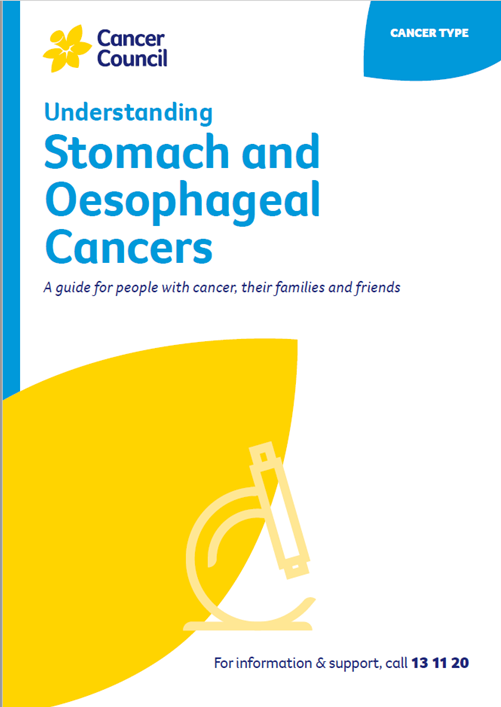- Home
- Stomach cancer
- Diagnosis
- Staging and prognosis
Staging and prognosis for stomach cancer
These tests help show whether you have stomach cancer and whether it has spread. Working out how far the cancer has spread is called staging. It helps your doctors recommend the best treatment for you.
Learn more about:
Staging
The TNM staging system is the method most often used to stage stomach cancer. TNM stands for “tumour, node, metastasis”.
The specialist gives numbers to the size of the tumour (T1–4), whether or not lymph nodes are affected (N0–N3), and whether the cancer has spread or metastasised (M0 or M1). The lower the numbers, the less advanced the cancer.
The TNM scores are combined to work out the overall stage of the cancer, from stage 1 to stage 4 (see table below). Ask your doctor to explain what the stage of the cancer means for you. You can also call Cancer Council 13 11 20.
Stages of stomach cancer
| stage 1 | early or limited cancer | tumours are found only in the stomach wall lining |
| stages 2-3 | locally advanced cancer | tumours have spread deeper into the layers of the stomach and to nearby lymph nodes |
| stage 4 | metastatic or advanced cancer | tumours have spread beyond the stomach to nearby lymph nodes or parts of the body, or to distant lymph nodes and parts of the body |
Prognosis
Prognosis means the expected outcome of a disease. You may wish to discuss your prognosis and treatment options with your doctor, but it is not possible for anyone to predict the exact course of the disease. Instead, your doctor can give you an idea about the general prognosis for people with the same type and stage of cancer.
To work out your prognosis and advise you on treatment options, your doctor will consider your test results; the type of cancer; the size of the cancer and how far it has grown into other tissue; whether the cancer has spread to the lymph nodes; how it might respond to treatment; and your age, level of fitness and medical history.
Generally, the earlier stomach cancer is diagnosed, the better the outcome of treatment. If cancer is found after it has spread, it may not respond as well to treatment.
I had surgery for stomach cancer, which is hard because my stomach is so much smaller. I have good days and bad days, but I’m back at work and I exercise every week. My prognosis for the future is good.
Brian
→ READ MORE: Your health care team
Podcast: Tests and Cancer
Listen to more of our podcast for people affected by cancer
More resources
Prof David I Watson, Matthew Flinders Distinguished Professor of Surgery, Flinders University, and Senior Consultant Surgeon, Oesophago-Gastric Surgery Unit, Flinders Medical Centre, SA; Prof Bryan Burmeister, Senior Radiation Oncologist, GenesisCare Fraser Coast and Hervey Bay Hospital, QLD; Kieran Cahill, Consumer; Jessica Jong, Clinical Dietitian, Upper GI and Hepatobiliary Services, Peter MacCallum Cancer Centre, VIC; John Leung, Consumer; Prof Rajvinder Singh, Professor of Medicine, University of Adelaide, and Director, Gastroenterology Department and Head of Endoscopy, Lyell McEwin Hospital, SA; Dr Sarah Sutherland, Medical Oncologist, Chris O’Brien Lifehouse, NSW; Paula Swannock, Upper GI Cancer Nurse Consultant, St Vincent’s Hospital Melbourne, VIC; Rebecca Yeoh, 13 11 20 Consultant, Cancer Council Queensland.
View the Cancer Council NSW editorial policy.
View all publications or call 13 11 20 for free printed copies.

